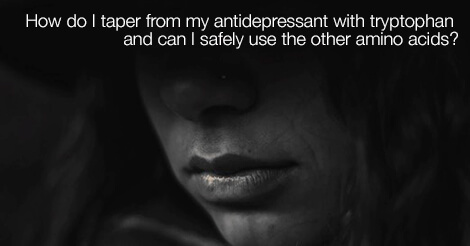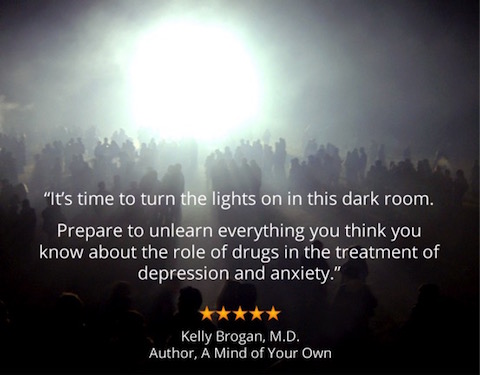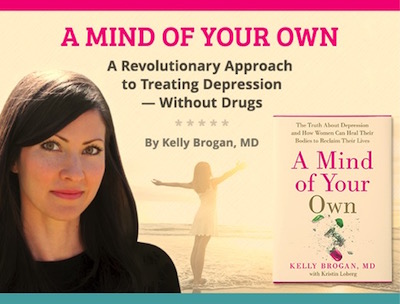Antidepressants can have an antibiotic effect, causing dysbiosis and impacting serotonin, GABA and dopamine production. This can cause psychiatric symptoms and even suicidal thoughts or behaviors. Various SSRI (selective serotonin reuptake inhibitors) and SNRI (serotonin norepinephrine reuptake inhibitors) have more of an effect than others. And the top known side effects for SSRIs are gut symptoms: nausea, diarrhea and vomiting.
These medications are seldom prescribed with informed consent and can cause severe psychological, cognitive, physical and neurological withdrawal side effects (also known as discontinuation syndrome). A functional medicine and nutritional approach using 5-HTP, GABA, theanine and glycine can often be used to smooth the taper process.
Dr. Achina Stein addresses all this in her interview, SSRI Impact on the Microbiome and Safe SSRI Tapering, on The Anxiety Summit 5: Gut-Brain Axis, which will be airing online Nov 8-14, 2021.
We cover the following:
- Antibiotic effect of antidepressants: dysbiosis and impacts on serotonin/GABA/dopamine
- Withdrawal/discontinuation syndrome symptoms of SSRIs and benzodiazepines
- 5-HTP, GABA, theanine and glycine to smooth the taper process
Here are a few snippets from our interview.
We start with a discussion on the antibiotic effect of antidepressants and a review of this paper – Serotonin Reuptake Inhibitors and the Gut Microbiome: Significance of the Gut Microbiome in Relation to Mechanism of Action, Treatment Response, Side Effects, and Tachyphylaxis.
Dr. Stein comments on this study sharing how SSRIs affect the gut and microbiome in many different ways:
- “This paper is important. It’s one of several papers that talk about how the SSRIs or serotonin reuptake inhibitors affect the gastrointestinal tract. And as you know, the gastrointestinal tract is really full of serotonin.
- SSRIs, as well as other psychotropic medications, actually exert an antibiotic effect, which can have a direct consequence in disrupting the integrity and stability of the gut microbiome.
- And the ones that are most likely to do that are Sertraline, fluoxetine, and paroxetine in that order. And it’s followed by fluvoxamine, escitalopram, and citalopram, having the least impact.
- What they’re noticing is that this antibiotic effect actually results in dysbiosis.
- The top known side effects for SSRIs are gut symptoms: nausea, diarrhea, vomiting.
- We know that the gut microbiome has a significant effect on emotions, behaviors, and metabolic changes.
- And it’s involved in the metabolism of drugs, and this combination is what really causes psychiatric symptoms and even suicidal thoughts or behaviors.”
She also talks about the bidirectional gut-brain connection/communication, the microbiome and short-chain fatty acids (which are a common theme you’ll hear throughout the summit):
- “There is this huge connection between the gut microbiome and the brain.
- And there’s also other indirect communication pathways because we’ve always wondered, well, how does this happen that the gut is connected to the brain?
- So the other pathways which are more indirect are the hypothalamic-pituitary-adrenal axis.
- And there’s also an immune-mediated connection where there’s a communication between short-chain fatty acids and microglia in the brain.
- So short-chain fatty acids are the main metabolites produced by the microbiota in the large intestine through bacterial fermentation of indigestible polysaccharides, which are dietary fiber and resistant starch. And they possess neuroactive properties. So they influence the communication between these short-chain fatty acids between the gut and the microglia of the brain.
- And it’s a bidirectional communication too.”
And we talk about tachyphylaxis or the poop-out effect of antidepressants.
The discussion on the SSRI (selective serotonin reuptake inhibitors) and SNRI (serotonin norepinephrine reuptake inhibitors) discontinuation syndrome (or withdrawal symptoms) is eye-opening and sobering, Here are just a few of the many psychological symptoms that she says patients may experience when tapering:
I’m just going to read them off because I think it’s important for people to know: mood swings, unstable moods, hypomania, hyperarousal, anxiety, medication-induced agitation – which is described as being caffeinated – impulsive behavior, aggression, irritability, crying spells, lowered mood or depression.
Dr. Stein also shares the many cognitive, physical and neurological side effects, and how she works with her patients with a functional medicine and nutritional approach to try and mitigate the side effects. She likes to use 5-HTP, GABA, theanine and glycine to smooth the taper process.
We also have a lengthy discussion about informed consent and the fact that it’s not happening and should be.
We do a deep dive into all this and much more.
The interviews that dove-tail well with this topic are as follows:
- My interviews, GABA & Tryptophan: Gut-Anxiety Connections and Glutamine, DPA and Tyrosine for Anxiety and Sugar Cravings. The amino acids help during the tapering process and help you make the dietary changes.
- Thiamine Deficiency in Anxiety and Gut Health (Part 1 and 2) with Chandler Marrs. She talks about how medications can deplete thiamine. Could this contribute to some of the severe discontinuation syndrome symptoms we see?
- Anxiety, Gut-Brain Communication and Diet with David Perlmutter, MD, FACN, ABIHM. This one gives you an excellent overview of the gut-brain communication and fermented foods, short-chain fatty acids and histone deacetylases (HDACs).
- Gut-Brain Axis and Mental Health with Peter Bongiorno, ND, LAc. This is also a great overview on the mental health impacts of the microbiome. He goes deep into serotonin and GABA production mechanisms.
I encourage you to register and tune in if you have:
- Anxiety & feel overwhelmed & stressed by little things
- Panic attacks &/or obsessive thoughts or behaviors
- Social anxiety/pyroluria
- Phobias or fears (flying, spiders or even driving on a highway)
And also if you suffer from…
- Food sensitivities, IBS/SIBO, parasites or gallbladder issues
- Constipation, diarrhea, bloating, gas, pain & other digestive issues
- Leaky gut, a leaky blood-brain barrier or vagus nerve issues
Join us if you are also an emotional eater with intense sugar cravings (and know you suffer from low blood sugar), experience insomnia, low mood, PMS, poor focus and/or low motivation.
This is THE online event to learn about the powerful individual amino acids – GABA, theanine, tryptophan, 5-HTP, glutamine, DPA and tyrosine – to quickly ease anxiety and help with gut symptoms while you are dealing with other root causes which take longer to address. (They also help with cravings as with this example, and sleep and immunity).
With research-based anxiety nutritional solutions and practical steps, you can determine your root causes, ease your anxiety and prevent it from coming back so you can feel on top of the world again!
If you are a practitioner, please join us too and find advanced solutions for your clients or patients too!
You’ve heard me say the Anxiety Summit has been called “a bouquet of hope!” My wish for you is that this summit is your bouquet of hope!
I hope you’ll join me and these incredible speakers, be enlightened and find YOUR solutions!
Here’s to no more anxiety and you feeling on top of the world again!
How have antidepressants impacted your gut and digestion?
Have you experienced discontinuation syndrome when tapering from an SSRI or SNRI or benzodiazepines? And have diet and the amino acids helped smooth the taper process?
Feel free to post your questions here too.





